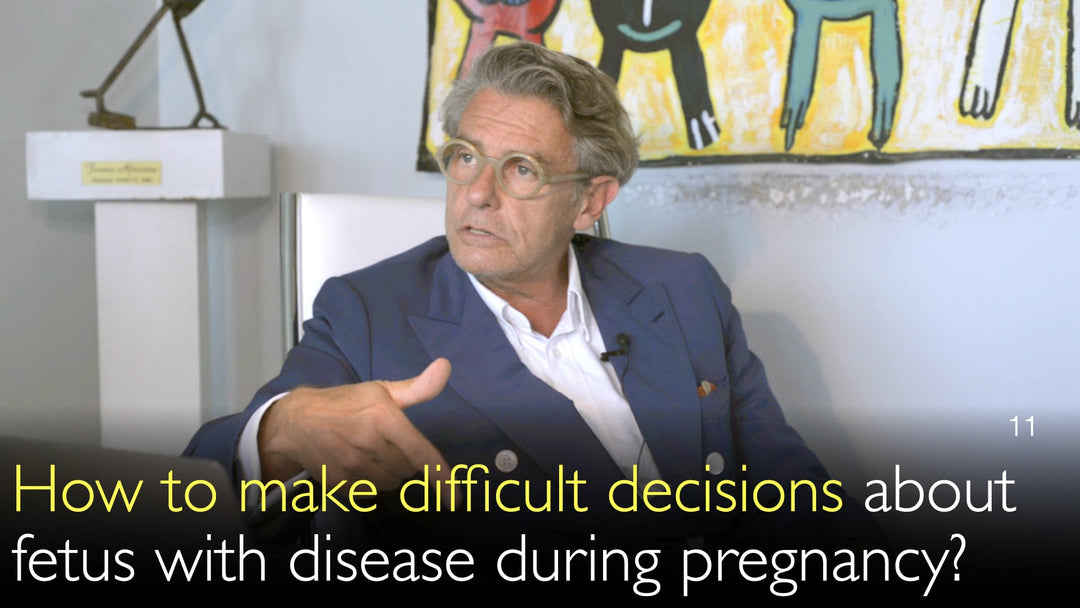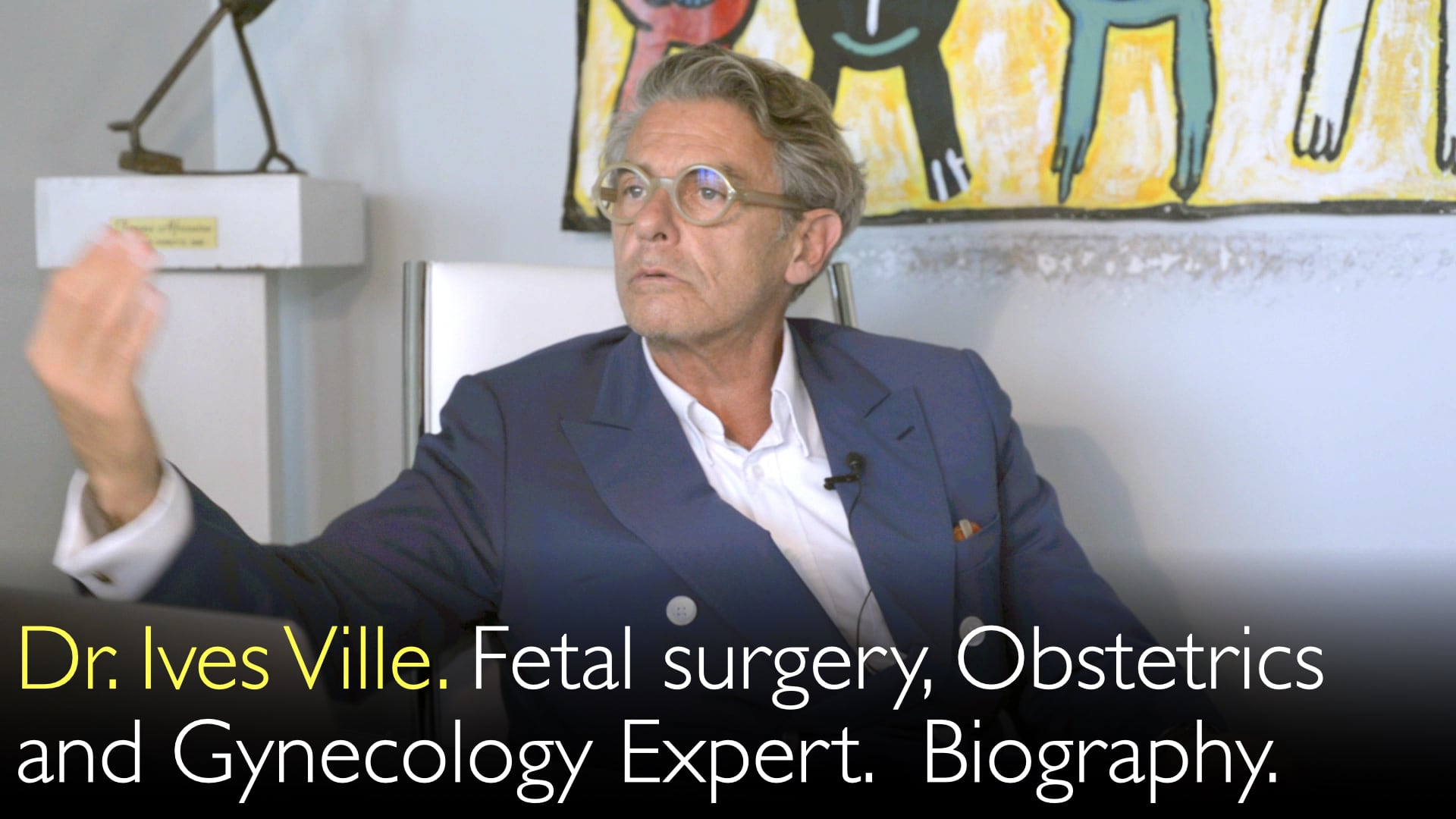태아 의학 분야의 선도적 전문가인 Yves Ville 박사(의학박사)는 복잡한 태아 진단이 어떻게 어려운 임신 결정으로 이어지는지 설명합니다. 그는 중증 태아 대동맥 협착증의 임상 사례를 상세히 다루며, 상당한 위험이 따르는 자궁 내 중재술과 같은 치료 옵션을 소개합니다. Yves Ville 박사는 명확한 정보 제공과 임산부의 선택을 지원하는 것의 중요성을 강조합니다. 또한 환자의 최종 결정에 영향을 미치는 매우 개인적인 요소들에 대해 논의합니다.
임신 중 복잡한 태아 진단과 치료 옵션 이해하기
항목 바로가기
태아 대동맥판막협착증 딜레마
Yves Ville 박사(의학박사)는 중증 태아 대동맥판막협착증의 복잡한 임상 사례를 소개합니다. 이 심각한 심장 질환은 임신 중 초음파로 진단됩니다. 진단 결과, 대동맥판막이 심하게 좁아져 혈류가 제한되고, 이로 인해 좌심실이 제대로 발달하지 못하는 좌심형성부전증후군이 발생합니다. 이 증후군으로 태어난 아이는 여러 차례의 수술을 받아야 하며 삶의 질이 현저히 낮아집니다. Anton Titov 박사(의학박사)는 Yves Ville 박사와 이 진단이 갖는 중대한 의미에 대해 논의합니다.
자궁 내 치료의 위험성과 결과
Yves Ville 박사(의학박사)는 중증 대동맥판막협착증에 대한 태아 중재 시술을 설명합니다. 이 시술은 초음파 유도 하에 태아 심장에 바늘을 삽입하는 방식으로 진행됩니다. 성인 심장학에서 사용하는 기법과 유사하게, 풍선 카테터를 이용해 좁아진 대동맥판막을 확장합니다. 이 고위험 중재 시술은 시술 직후 약 15%의 태아 사망 위험을 동반합니다. 양심실 순환을 회복시키는 성공률은 약 50%에 그쳐, 전체적으로 유리한 결과를 기대할 확률은 약 35%입니다. Yves Ville 박사는 시술이 성공하더라도 출생 후 추가 치료가 필요할 가능성이 높다고 덧붙입니다.
환자 결정 요인
Yves Ville 박사(의학박사)는 환자들이 동일한 의학 정보를 다르게 해석하는 방식을 강조합니다. 일부 여성은 15%의 사망 위험과 성공의 불확실성에 주목해 임신 중단을 선택하기도 합니다. 다른 여성들은 좋은 결과를 얻을 확률이 낮더라도 아기를 위해 “가능한 모든 것을” 해보고자 높은 위험을 감수하려 합니다. 또 다른 집단은 중재 없이 자연의 흐름을 따르기로 선택합니다. Anton Titov 박사(의학박사)는 태아 의학 전문가와 함께 이러한 다양한 반응을 살펴보며, 단 하나의 정답이 없음을 지적합니다.
의사의 역할: 선택 지원하기
Yves Ville 박사(의학박사)는 의료진의 비판단적 역할을 강조합니다. 의사의 주된 임무는 환자가 진단 내용, 모든 치료 옵션, 관련 위험과 이점을 충분히 이해하도록 돕는 것입니다. 여기에는 명확한 소통과 환자가 충격적인 소식을 받아들일 시간을 주는 것이 포함됩니다. 최종 결정은 항상 임신부에게 있으며, 이는 그녀의 몸이자 그녀의 잠재적 자녀이기 때문입니다. Ville 박사의 접근 방식은 개인적인 가치관을 강요하지 않고 환자를 지지하고 따르는 데 있습니다.
선택에 미치는 심리적 및 개인적 영향
Yves Ville 박사(의학박사)는 결정이 결코 진공 상태에서 이루어지지 않는다고 설명합니다. 환자의 삶의 역사, 관계, 어린 시절 경험과 같은 깊이 개인적인 요소들이 종종 그들의 선택을 형성합니다. 예를 들어, 외모가 직업과 직결된 여성은 태아 안면열 진단을 더욱 힘들어할 수 있습니다. 반면, 이 임신이 마지막 아이를 가질 기회인 여성은 더 큰 위험을 감수하려 할 수 있습니다. Anton Titov 박사(의학박사)와 Ville 박사는 이러한 독특한 인간적 요소를 이해하는 것이 공감적 치료의 핵심이며, 이처럼 깊이 개인적인 결정에는 보편적인 패턴이 없다고 결론짓습니다.
전체 대본
Anton Titov 박사(의학박사): 오늘 논의한 주제와 관련해 실제 진료에서 마주한 환자 사례가 있나요? 구체적인 예시나 여러 사례를 종합한 내용이라도 괜찮습니다.
Yves Ville 박사(의학박사): 이런 딜레마는 가끔 매우 갑작스럽고 명확하게 드러납니다. 치료 가능한 질환이더라도, 한 여성은 어떤 위험도 감수하지 않겠다며 임신 중단을 요청할 수 있고, 다른 여성은 어떤 상황에서도 임신을 계속하기로 선택할 수 있습니다.
태아 빈혈처럼 비교적 쉽게 치료할 수 있는 경우에도 비슷한 상황이 발생합니다. 하지만 사람들이 진단 소식의 충격에서 헤어나오려면 시간이 필요합니다. 정보를 제공하고 질문에 답해주면, 대부분의 사람들은 이성적으로 판단합니다.
대다수의 사람들은 이성적입니다. 우리는 그들을 위해 일합니다. 다만 심리적이나 정신과적 문제가 있는 경우는 예외입니다—그때는 모체의 문제가 되죠, 임신 중단 여부를 고려해야 하는 상황이 될 수 있습니다.
이성적인 사람들을 대할 때는 극단적인 사례를 자주 접하지는 않습니다. 하지만 치료 결과가 불확실한 경우, 예를 들어 태아경이 아닌 초음파 유도 하에 시행되는 대동맥판막 중재 시술처럼요. 중증 대동맥판막협착증이 발생한 경우입니다.
임신 초기에 중증 대동맥판막협착증이 생기고 혈류가 극도로 제한되면, 좌심실이 발달하지 못해 좌심형성부전증이 됩니다. 아이는 한 개의 심실만 가지고 태어나 여러 번의 수술을 거쳐야 하며, 완전한 치료는 불가능합니다. 수술이 반복되는 삶이고, 기대 수명도 길지 않으며 편안하지 않습니다.
이런 진단—태아 대동맥판막협착증은 초음파로 확진 가능합니다—을 받으면 선택지는 세 가지입니다: 자연 경과를 따르기, 임신 중단, 또는 자궁 내 치료 시도하기.
자궁 내 치료는 초음파 유도 하에 바늘을 좌심실에 삽입한 후, 대동맥의 협착된 판막까지 카테터를 진행시킵니다. 그리고 심장학에서 관상동맥 확장에 쓰는 것과 같은 풍선으로 판막을 넓힌 후 바늘을 제거합니다.
이 시술은 위험합니다. 즉시 사망 위험은 약 15%입니다. 또한 결과가 불확실합니다. 판막 확장에 성공하더라도 혈류가 원활해지고 심실이 성장할지 여부는 알 수 없어, 시술 후 몇 주간의 관찰 기간이 필요합니다.
동일한 임상 소견과 설명을 들어도 환자들은 완전히 다른 선택을 합니다. 어떤 여성은 “죄송합니다, 성공률이 50%에 시술 관련 사망 위험이 15%라고 하시니, 유리한 결과 확률이 35%이고 출생 후 추가 시술이 필요할 수 있다고요. 전 그런 위험을 감수하지 않겠습니다.”라고 말합니다.
다른 여성은 “이미 심실이 섬유화됐고, 사망 위험이 15%이고 성공 확률이 10-20%라고 하셨지만, 저는 이 아이를 위해 모든 것을 해보고 싶어요. 나중에 아이가 죽더라도요.”라고 합니다. 또 어떤 이들은 “15% 사망 위험이라면 차라리 아무것도 안 하겠어요.”라고 말합니다. 비록 두 심실이 정상 기능을 할 확률이 5%밖에 되지 않더라도요.
다시 강조하지만, 이는 정신분열증 환자를 위한 일이 아닙니다. 판단해서도 안 됩니다. 그저 설명해주고, 환자가 모든 것을 이해했는지 확인한 뒤 그녀의 선택을 따르세요. 그녀의 임신이자, 그녀의 잠재적 아이이기 때문입니다.
Anton Titov 박사(의학박사): 환자들—임신부들—을 이렇게 다양한 선택을 보이는 집단으로 분류할 수 있나요? 어떤 경향성이 있나요? 체계가 보이나요? 아니면 어떤 유형의 사람에게서든 예측不能으로 나타날 수 있나요? 패턴이 있나요?
Yves Ville 박사(의학박사): 패턴? 저는 그것을 패턴이라고 부르지 않겠습니다. 하지만 그들의 삶, 역사, 어린 시절, 관계를 충분히 들여다보면 그 결정의 뿌리를 찾을 수 있습니다.
때로는 쉽습니다. 예를 들어—또 다른 극단적인 사례입니다—태아가 안면열을 가진 경우, 그 여성이 모델이라고 가정해보죠. 왜 그녀가 모델이 되었을까요? 그녀에게 작용한 외부 압력은 무엇일까요? 그녀가 안면열을 가진 태아를 받아들일 수 있을까요? 아마 일반적으로는 가능하겠지만, 개별적으로 그렇다는 보장은 없습니다.
하지만 일반적으로, 외모나 행동에 외부 압력이 없는 여성보다는, 예를 들어 이 아이가 마지막임을 안 여성이 더 큰 위험을 감수하려 할 수 있습니다.
보편적인 패턴은 없습니다. 항상 어딘가에—때로는 매우 이해하기 쉬운, 때로는 아주 깊은—그들의 결정을 이루는 요소들이 있습니다. 그것이 인간의 본질이죠.





